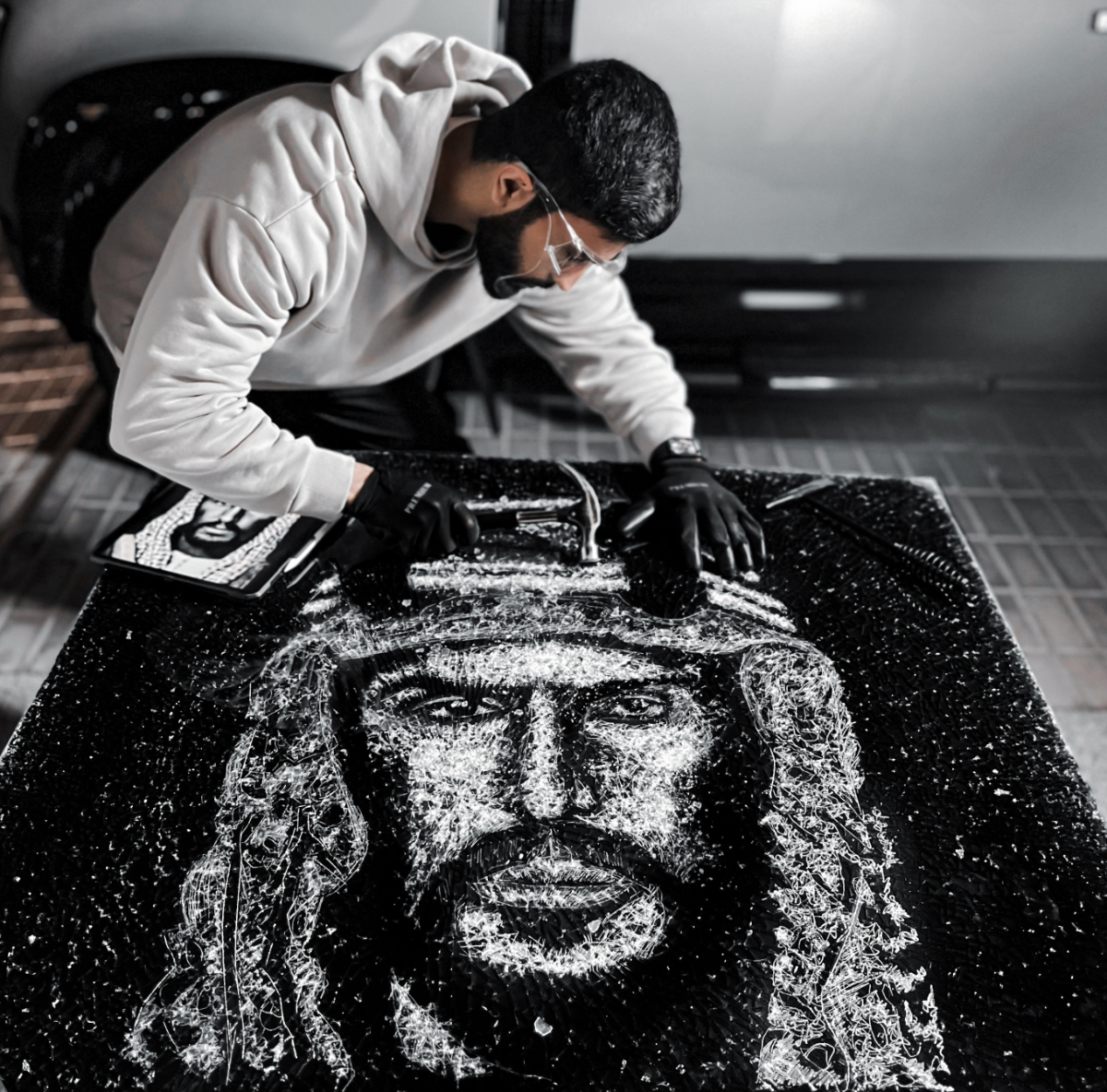RIYADH: Saudi artist Aseel Al-Maghlouth is hammering a niche for himself by using glass as his canvas.
He stumbled upon the technique while working on his graduation project in mechanical engineering. “I discovered the potential to employ broken glass to create distinctive artistic designs,” he told Arab News.
The intricate details that appear when glass breaks inspired him to create shapes and visuals and developed a technique that reflected his artistic vision.

Al-Maghlouth turns broken glass into stunning art, showcasing the beauty in fragility and redefining artistic norms. (Supplied)
Al-Maghlouth had a love for drawing from a young age, but it was not until he discovered his ability to express ideas in unconventional ways that his true passion for art crystallized.
“I have always drawn inspiration from the surrounding nature and the intricate details of daily life,” he said. This connection to his environment, combined with his experiences in exploring artworks, helped shape his unique style.
He finds beauty in the mundane and translates that into his creations, often using glass to convey emotions and narratives that might resonate with viewers.
HIGHLIGHT
By embracing the fragility of glass and transforming it into something beautiful, Saudi artist Aseel Al-Maghlouth challenges perceptions of what art can be.
Al-Maghlouth has gained significant recognition on social media, where his works are widely admired.
This newfound fame has allowed him to sell his works and create custom pieces for clients, including various artists and celebrities. “Creating for such esteemed individuals is an honor, and it motivates me to push my artistic boundaries,” he said.

"Each painting has its own place and story that distinguishes it.” (Supplied)
“The best work I own is the painting of Crown Prince Mohammed bin Salman. Frankly, I consider it the most valuable painting I have ever owned, but I refuse to sell it because it was a special gift from me to the crown prince,” he said.
“I have received many offers but I refuse to sell it. As for the rest of my paintings, I prefer not to mention the prices because the value of art for me is not limited to a number. Each painting has its own place and story that distinguishes it.”
One of the greatest challenges Al-Maghlouth faced as an artist was transforming his creations into messages that resonated with his audience. “The biggest challenge was ensuring that my art conveyed a clear idea,” he said.
I want to highlight the beauty of arts in our Saudi culture and connect it with Saudi Vision 2030.
Aseel Al-Maghlouth, Saudi artist
Through experimentation with the nature of glass fractures and the control of his technique, he minimized errors and created pieces that told meaningful stories.
Each strike of the hammer is deliberate, aimed at producing not just a fragment but a narrative that can be interpreted and appreciated by those who view it.
“I want to highlight the beauty of arts in our Saudi culture and connect it with Saudi Vision 2030,” he added, emphasizing the importance of cultural representation in his work.
Al-Maghlouth’s vision for the future is ambitious. He aspires to participate in international exhibitions, representing Saudi Arabia on a global stage. “I dream of organizing a personal exhibition in Riyadh to showcase my works and exchange inspiration with other artists,” he said.
For emerging artists, Al-Maghlouth has simple yet profound advice: “Don’t be afraid of trial and error. Each piece of art reflects a part of you.”
He encourages newcomers to continue developing and learning from every experience, and emphasizes the importance of perseverance in the face of challenges.
His journey is testament to the idea that creativity flourishes in an environment where risks are taken and failures viewed as stepping stones rather than obstacles.
Al-Maghlouth’s work serves as a reminder that art can emerge from the most unexpected materials and methods, encouraging others to explore their creativity without constraints.
By embracing the fragility of glass and transforming it into something beautiful, he challenges perceptions of what art can be.
Al-Maghlouth remains committed to honoring the stories behind each piece, proving that even the most broken fragments can come together to create something truly extraordinary.






























